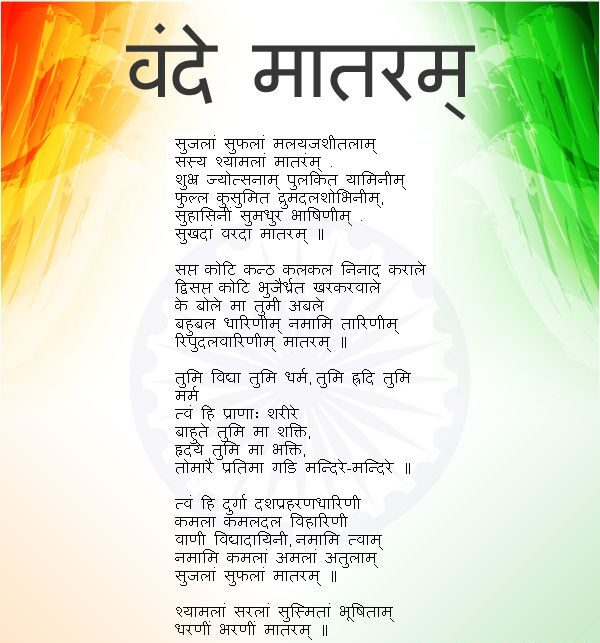5 Powerful Facts About National Song of India – Vande Mataram & Its Timeless Significance
National Song of India: India’s National Song, Vande Mataram, is not just a melody but a symbol of patriotism, unity, and cultural heritage. It has inspired countless freedom fighters, played a crucial role in India’s independence movement, and continues to be a source of pride for every Indian.
Let’s explore the history, significance, impact, and facts about Vande Mataram in detail.
Biography of the National Song of India
- Title: Vande Mataram
- Meaning: “I Bow to Thee, Mother”
- Author: Bankim Chandra Chattopadhyay
- Language: Sanskrit & Bengali
- First Appearance: In the novel Anandamath (1882)
- Music Composer: Rabindranath Tagore first composed the tune
- Adopted As National Song: January 24, 1950
History of Vande Mataram: National Song of India
Vande Mataram was penned by Bankim Chandra Chattopadhyay in 1875 and later included in his novel Anandamath (1882). The song was a tribute to Bharat Mata (Mother India) and symbolized the struggle against British rule.
It became the war cry for Indian freedom fighters, often sung at protest rallies and nationalist movements. The first public rendition of Vande Mataram was at the 1896 Indian National Congress session by Rabindranath Tagore.
Significance of the National Song of India
- Symbol of Patriotism
- Vande Mataram was the battle anthem for freedom fighters like Bal Gangadhar Tilak, Bipin Chandra Pal, Lala Lajpat Rai, Subhas Chandra Bose, and many more.
- Emotional Connection
- The song evokes deep emotions, bringing people together irrespective of religion or caste.
- Cultural Heritage
- It represents the rich literary and cultural heritage of India and highlights the country’s unity in diversity.
- Inspired Freedom Movements
- The song became a rallying cry during movements like the Swadeshi Movement (1905) and Quit India Movement (1942).
- National Recognition
- While Jana Gana Mana became the National Anthem, Vande Mataram was given equal status as the National Song in 1950.
Daily Life Impacts of Vande Mataram: National Song of India
Even after independence, Vande Mataram continues to hold an important place in Indian society:
✅ Patriotic Events & Celebrations – Played on Republic Day, Independence Day, and national ceremonies.
✅ School Assemblies & Competitions – Sung in schools and colleges to instill nationalism among students.
✅ Inspiration in Arts & Films – Used in movies, songs, and books to showcase patriotism.
✅ Sports & Politics – Sung during sports events and political rallies to encourage unity and pride.
Lesser-Known Facts About Vande Mataram: National Song of India
1️⃣ Vande Mataram was almost chosen as India’s National Anthem, but Jana Gana Mana was preferred due to its secular nature.
2️⃣ The British bannedVande Mataram in 1905, fearing it would fuel rebellion.
3️⃣ A. R. Rahman’s remix version of Vande Mataram in 1997 revived its popularity among youth.
4️⃣ The song is inspired by the beauty of India, depicting rivers, mountains, and the motherland.
5️⃣ It has been translated into multiple Indian languages and is respected nationwide.
Observance & Usage in Society: National Song of India
✔ Republic Day & Independence Day – Officially played during celebrations.
✔ School & College Functions – Students perform Vande Mataram as a tribute to the country.
✔ Political Gatherings – Leaders and organizations use it as a motivational chant.
✔ Public Broadcasts – Televised and played on the radio to honor India’s history.
FAQs About National Song of India
1️⃣ Who wrote Vande Mataram?
Bankim Chandra Chattopadhyay wrote Vande Mataram in 1875.
2️⃣ When was it first sung publicly?
It was first sung by Rabindranath Tagore at the 1896 Indian National Congress session.
3️⃣ Why was Vande Mataram not made the National Anthem?
Since Vande Mataram contains references to Hindu deities, Jana Gana Mana was chosen to ensure religious neutrality.
4️⃣ Is singing Vande Mataram mandatory in India?
No, singing it is not legally mandatory, but it is encouraged as a symbol of national pride.
5️⃣ What is the official status of Vande Mataram?
It is recognized as India’s National Song, alongside Jana Gana Mana (National Anthem).
Wishing & Messages Related to Vande Mataram: National Song of India
🌟 “Let the spirit of Vande Mataram ignite patriotism in our hearts forever!”
🇮🇳 “Proud to be an Indian! Salute to the song that fueled our freedom struggle! #VandeMataram”
🎉 “On this special occasion, let’s remember the song that united our nation. Jai Hind!”
Final Thoughts: National Song of India
India’s National Song, Vande Mataram, is more than just words—it’s an emotion, a revolution, and a reminder of our freedom struggle. It continues to inspire millions and remains a powerful symbol of India’s unity and cultural richness.
💬 What does Vande Mataram mean to you? Share your thoughts!
🔔 Don’t forget to spread the patriotic spirit by sharing this article! 🚀










